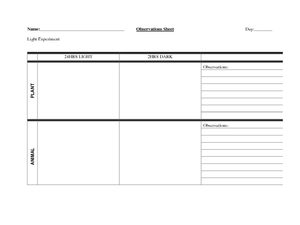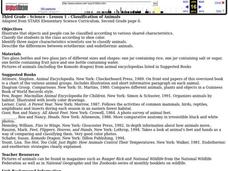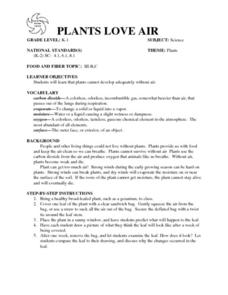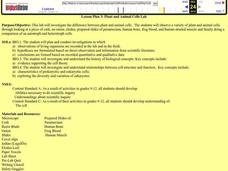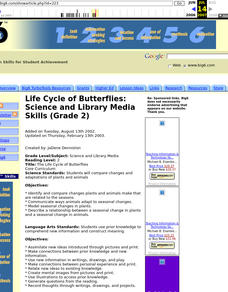Curated OER
Bugs, Bugs, Everywhere!
Young scholars collect and compare bugs using magnifying lenses and graph data based on their comparisons. In this bugs lesson plan, students also make an aspirator by using a jar, tubing, and screen.
Curated OER
Rain Forest Terrariums
Fifth graders make rain forest terrariums in order to observe a simulated mini-environment. They place the layers and plants into container and place where it can be observed. They observe the closed water system in the container before...
Curated OER
Adaptation and Diversity on Sheffield Island
Written for an exploration of shoreline ecosystems on Sheffield Island, this gives ecology or marine biology buffs a hands-on experience. Using GPS or visual triangulation techniques, they lay transect lines on a high and a low energy...
Curated OER
Protecting the Critical Habitat of the Manatee and the Loggerhead Turtle
First graders research Belize and its landscape and animals on the included internet sites. The students complete activities/centers across the curriculum utilizing the facts they discovered.
Curated OER
What on Earth is in the Earth?
Students explore the physical properties of sand, soil, and rocks and sort, classify, compare, and contrast the materials found in the soil. The differences between the living and non-living parts of the soil is discussed.
Curated OER
Classification Scheme
Fourth graders discuss different classification schemes for living organisms. They group common household items to discover many ways to classify organisms. Students compare/contrast characteristics of each classification.
Curated OER
Organisms – Their Needs
Young scholars compare and contrast different organisms characteristics. In this life science lesson, students design an experiment about plants and animals needs. They collect data and write their conclusion about the experiment.
Curated OER
Classification of Animals
Third graders practice classiyfying items and identify three major characteristics scientists use to classify animals. They describe the differences between ectothermic and endothermic animals.
Curated OER
PLANTS LOVE AIR
Students identify that plants cannot develop adequately without air and predict what happens to the leaf of a geranium brought to class. They draw a picture of what they think the leaf will look like after a week of being covered....
Curated OER
The Wonderful World of Polymers
Seventh graders investigate the concept of polymers. They discover unique properties and how polymers are natural. The lesson plan contains sufficient background information for the teacher. Students examine different types of materials...
Curated OER
Managing Nutrients in Livestock Manure
Livestock managers reinforce math and science skills while learning about the nutrients found in manure. They predict which animal produces the largest amount and which animal's manure contains the most nitrogen. Finally, they compare...
Curated OER
Plant and Animal Cells
High schoolers investigate the difference between plant and animal cells. They observe a variety o plant and animals cells by looking at a piece of cork, an onion, elodea, prepared slides of paramecium, human bone, frog blood, and human...
Curated OER
Soil Composition
Young scholars examine soil. In this soil composition lesson students participate in soil sedimentation and filtration activities. The young scholars discuss what non-living and living things are in soil and why it is so important.
Project Noah
Writing Goes Wild
Young scientists develop their observation and writing skills as they craft and then post a detailed description of a plant or animal they have spotted and photographed.
Virginia Department of Education
Cell Parts
What do a bird, an egg, a rabbit, and a toad all have in common? This fun-filled resource explains the similarities and differences between cells and how all cells are similar, yet all are different. Learners begin by depicting a...
Curated OER
Weather Lesson 1
Students describe and compare the layers of the atmosphere. They explain how to measure the temperature of the atmosphere. They also explain what causes the atmosphere to heat up in some places more than in others.
Curated OER
Prairie Adaptations
Twelfth graders consider the survival of prairie plants. They examine how some tallgrass prairie species are adapted to the conditions of their ecosystem. They make a prediction of how a species might change given new conditions.
Desert Discoveries
Creating a Garden Journal
Youngsters create science journals which are used to record observations from the school garden. The goal of this activity is to help kids tune into nature by making daily observations on the growth of the plants, and also to take note...
Curated OER
I Wonder What a Pest Is...
Students observe what animals are considered to be pests and why. They conduct a mock trial of a honeybee arguing if it is a pest or not. They determine pros and cons of honeybees to prepare for the trial.
Andrea Mulder-Slater
Happy Accidents Painting
A person can see a lot of different things when he looks at the amorphous clouds. The same is true when you let your watercolor paints do as they please. Little artists create haphazard art with watercolors, then use ink or marker to...
Curated OER
What's Organic?
Young scholars discuss background information presented by the teacher and read dictionary definitions for the words "organic" and "synthetic." In this gardengin lesson, students complete a worksheet on the material. Young scholars grow...
Curated OER
Exploring Texture In the Garden
Students explore the garden environment. In this garden environment lesson, students investigate the needs and parts of a plant. Students discover the differences between fruits and vegetables while creating their own garden.
Curated OER
Six Kingdom System of Classification
In this classification worksheet, students complete a graphic organizer comparing and contrasting the characteristics of the 6 different kingdoms.
Curated OER
Life Cycle of Butterflies
Students identify ways plants and animals make changes related to the seasons, specifically focusing on the life cycle of butterflies.








